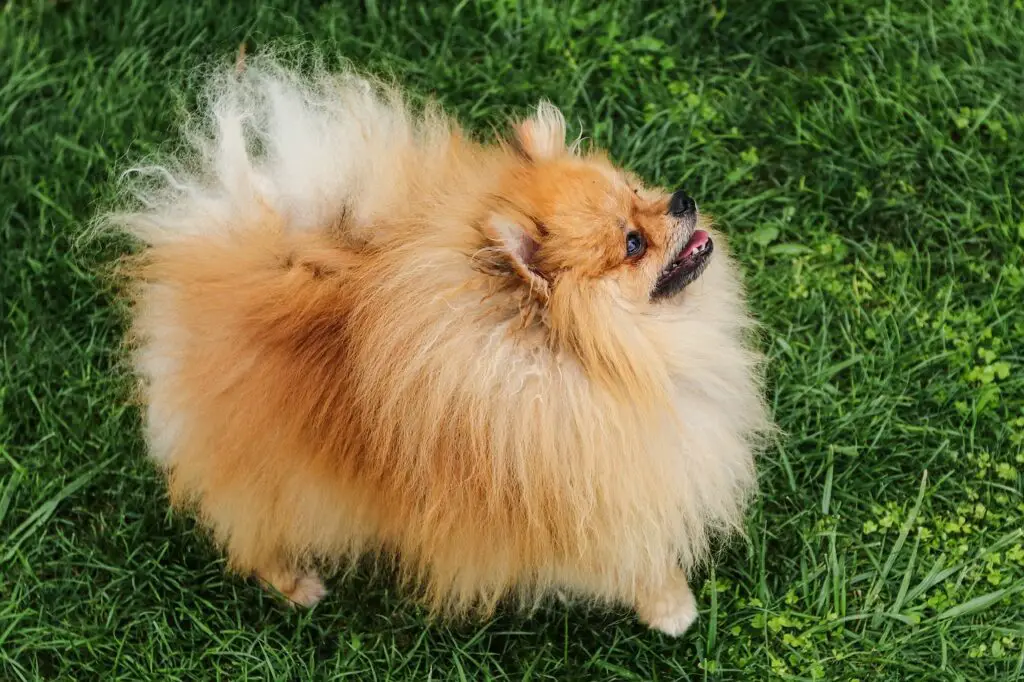When choosing a furry companion, most potential dog owners consider barking, among other behaviors.
Some breeds bark uncontrollably, loudly and frequently, while others are minimum barkers.
While selecting one among many breeds, you may be wondering, do Pomeranians bark?
Yes, Pomeranians do bark.
This, however, depends on their lifestyle, early socialization, and personality.
They use barking as an alarm and a way of expressing their concerns.
Learning about a dog’s barking helps determine if it suits your preferences.
In this article, you’ll find everything about Pomeranians barking, including its reasons.
Read on to learn how much they bark and how you train them not to bark.

At what age do Pomeranians start barking?
Some dogs start barking at an earlier age than others.
Before bringing a Pomeranian home, you may want to know when the little pup will start barking.
Pomeranian puppies start barking from the age of 7 to 10 weeks.
Before that, they use cries, grunts, and whines to express themselves.
You’ll find that those puppies who’ve grown around other dogs learn earlier than those who grow alone.
This is because puppies learn and copy the behaviors of dogs around them.

How much do Pomeranians bark?
Pomeranians are social and extroverted dogs.
When they bark, they need you to hear them and attend to the matter.
Pomeranians bark a lot.
Their barking is more than the average dog breed, sometimes referred to as a Pomeranian’s yapping.
They’re vocal, and most don’t know when to stop barking.
Pomeranians descended from German Spitz dogs, a strong, hardworking breed.
For this reason, Pomeranians possess the big dog mentality, making them bark until noticed, even though they’re small in size.
Why do Pomeranians bark a lot?
Pomeranians are known to bark a lot.
However, sometimes they may bark repeatedly and uncontrollably.
By understanding the reasons, you’ll deal with the behavior and communicate with it better.
These reasons include:
Watchdog mode: Pomeranians are natural watchdogs, and they can bark as a way of communicating about approaching danger.
They also bark whenever they hear, see or smell anything unusual.
Excitement: Your Pomeranian can bark to express joy.
This could be from your arrival home, visiting its favorite parks or meeting other dogs.
Lack of physical and mental stimulation: Dogs need frequent physical activities and mental stimulation to use their energy.
The lack of these makes them resort to destructive behaviors, including excessive barking.
Physical injuries and sickness: Sometimes, barking is your Pomeranian’s way of telling you about its injuries or underlying health conditions.
You can rule this out by visiting a veterinarian.
How do you stop a Pomeranian from barking?
It’s unfair and impossible to make your Pomeranian mute.
However, you can train it to only bark when necessary.
Let’s look at ways to stop this breed from barking every time.
- Find the things that trigger the barking and remove them.
- Have control over your dog by training it to understand and obey command words like no and good job.
- Always have your Pomeranian’s favorite treats within reach. Whenever it barks, wave the treat close to its mouth, and it’ll stop barking in an attempt to grab the treat.
- Don’t give treats immediately when your dog stops barking. Only reward after several minutes of quietness and continue increasing the time intervals.
- Spare some time every day to cuddle and bond with your dog. Sometimes your Pim may be barking due to a lack of attention and affection.
- Ensure that it receives its daily dose of physical and mental stimulation. Play fetch, go for jogs, and run daily to make your dog utilize its high energy.
- Sometimes your Pomeranian may continue barking even after taking all known measures. Seek help from your dog’s breeder or a veterinarian.
How do you prevent a Pomeranian from barking in common situations?
Although vocal, your Pomeranian can learn to express itself in other ways that don’t involve barking.
Some everyday situations cause Pomeranians to bark, making them a nuisance.
Let’s look at how you can prevent this.
Doorbell rings and door knocks: Since Pomeranians are watchdogs, they’re sensitive to movement and will alert you whenever someone knocks or rings your doorbell.
To avoid your dog from alerting you on this every time, acknowledge its efforts verbally or through a treat whenever he doesn’t react.
Barking at other dogs: Your Pomeranian can bark at other dogs because of social issues.
Allow your dog to meet and interact with other dogs in a safe environment.
Reward it for every good behavior during the interaction.
This helps it be comfortable around other dogs.
When they want something: Pomeranians are demanding in nature and can bark until they get what they want.
Ignore them or use a command word that means no.
Remember to reward them every time they stop barking to cement the behavior.
How do you stop a Pomeranian from barking at night?
Your Pomeranian may bark at night for several reasons.
These include loneliness, fear, or restlessness.
Although these and other reasons can trigger the barking, below are ways you can stop it:
If your dog sleeps outside alone, allow it to sleep inside. The outdoors may be lonely and scary owing to noises and movements.
Try using a white noise machine next to its crib if the barking results from other dogs or external sounds.
Exercise your Pomeranian before bedtime. The barking may be due to inactivity during the day. Exercises help make them tired, so they can sleep easily and throughout the night.
Conclusion
Now that you know everything about Pomeranian barking, you’ll know if the breed meets your profile.
When you get one, look out for the triggers for its barking.
You can tame excessive barking by providing daily physical and mental stimulation, socialization with other dogs, and regular attention.
Although some reasons are controllable, others require the intervention of a professional breeder or a veterinarian.
Sometimes, your dog may be feeling pain from injuries or underlying health issues.
- What Dog Breeds Have Pink Skin? - March 24, 2023
- What Are the Most Inspiring Dog Breeding Quotes? - March 20, 2023
- Can Pheromone Spray Help Improve Dog Breeding Results? - March 19, 2023








